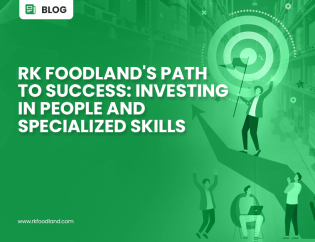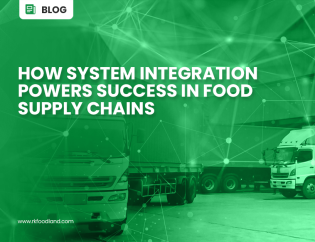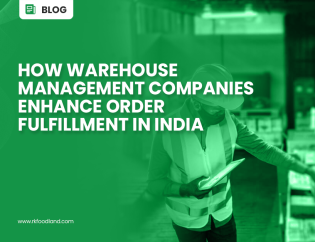
[Avg. Read Time: 4 mins]
In a bustling city, at the heart of a renowned food market, a local bakery known for its artisanal breads and pastries faces an unexpected challenge: a sudden surge in demand for gluten-free options. This mirrors the broader shifts in the food industry, where evolving consumer trends necessitate agile and responsive supply chains. From the meticulous sourcing of gluten-free flour to the integration of innovative baking techniques, the bakery’s journey exemplifies the essence of adapting supply chains in the face of changing consumer preferences.
As we delve into the intricate relationship between consumer behaviour & demands, and supply chain strategies, we uncover how businesses are navigating the complexities of health and wellness, convenience, sustainability, personalization, and the digital marketplace. This exploration reveals the essential role of strategic partnerships and technology in ensuring that supply chains are not just efficient but also resilient and aligned with the values of today’s discerning consumers.
Aligning Supply Chains with Evolving Consumer Trends
Understanding the shifting tides of consumer preferences and the consequent evolution of food supply chains reveals a complex interplay between demand and operational efficiency. Here’s how each consumer trend is reshaping supply chain strategies:
-
Prioritizing Health and Wellness
- Consumer Preference: With an uptick in demand for natural, organic, and plant-based options, consumers are more health-conscious than ever.
- Supply Chain Evolution: Adapting to the health and wellness trend involves not just diversification of product lines but also a fundamental shift in sourcing, with an emphasis on securing ingredients from verified but reliable sources. Supply chains are integrating advanced technologies for better inventory management, ensuring that products are always fresh and available. By implementing rigorous quality control measures and traceability systems, supply chains ensure that health and wellness products meet the highest standards of safety and efficacy. Regular audits and certifications from recognized bodies maintain continuous quality adherence, thereby elevating the value and integrity of these products in the eyes of consumers.
-
Demand for Convenience
- Consumer Preference: The fast-paced lifestyle of today’s consumers has escalated the demand for ready-to-eat meals and on-the-go snacks.
- Supply Chain Evolution: To meet the convenience demand, supply chains are leveraging AI and machine learning for predictive analytics, ensuring accurate forecasting to prevent stockouts of popular products on shelves and meal options at QSR chains. The deployment of sophisticated warehousing solutions, including Automated Storage and Retrieval System, and automated fulfilment centres, is aimed at reducing delivery times. Enhanced logistics solutions like mulit-temperature vehicles with continuous monitoring are also being deployed to maintain product quality and integrity during transit, ensuring that convenience does not compromise service assurance.
-
Focus on Sustainability and Ethical Sourcing
- Consumer Preference: A growing eco-conscious consumer base demands sustainable production practices and ethical sourcing, alongside eco-friendly packaging.
- Supply Chain Evolution: Supply chains are undertaking comprehensive life cycle assessments to identify and mitigate environmental impacts across the product journey. The adoption of blockchain technology for traceability ensures transparency in ethical sourcing practices, allowing consumers to verify the sustainability credentials of their purchases. Efforts to reduce carbon footprints are being amplified by investing in renewable energy sources and exploring biodegradable packaging solutions to replace conventional plastics, as well as biofuels to substitute for fossil fuels in logistics operations.
-
Personalization and Customization
- Consumer Preference: The desire for customizable and personalized meal options underscores the consumer’s quest for individuality in their food choices.
- Supply Chain Evolution: Advanced data analytics and consumer insights are driving the customization trend, with supply chains deploying configurable networks that can swiftly adapt to supply a variety of customized products efficiently. Customer relationship management systems are being integrated with supply chain operations to gather and analyse consumer data, facilitating personalized marketing and product development strategies. This approach not only meets individual consumer needs but also enhances brand loyalty and market differentiation.
This comprehensive approach to understanding and addressing the shifting consumer preferences through adaptive supply chain strategies ensures businesses can remain competitive, sustainable, and responsive to market demands.
Strategic Partnerships for Shared Success
For food businesses navigating the rapidly evolving landscape, the path to achieving enhanced supply chain capabilities is marked by strategic considerations and the pivotal decision between insourcing and outsourcing. To keep pace with dynamic market demands, companies must undertake a meticulous analysis, focusing on:
Strategic Considerations:
- Core Competencies Evaluation: Does your business have a clear understanding of its core strengths? Assess whether current operations are aligned to capitalize on these areas effectively.
- Flexibility and Scalability Check: Can your supply chain quickly adapt to changing market demands and scale operations accordingly? Evaluate your system’s responsiveness to fluctuating consumer needs.
- Quality Control Measures: Are there robust processes in place to ensure consistent quality across your products? Review your quality control protocols from sourcing to delivery.
- Technological Advancements Integration: How well is your supply chain leveraging technology? Check for the integration of AI, blockchain, IoT, and other innovations that enhance efficiency and transparency.
- Sustainability and Ethics Commitment: Does your operation embody sustainability and ethical practices? Assess your supply chain’s alignment with environmental and social values.
If your supply chain meets all the criteria mentioned above, you’re ahead of many in the food industry. This puts you in a strong position to explore new strategies for growth and efficiency.
Insourcing vs. Outsourcing: What Strategy to Consider?
The choice between insourcing and outsourcing supply chain operations is pivotal. While insourcing offers control and integration, outsourcing to specialized partners can provide expertise, efficiency, and scalability without the overheads of developing in-house capabilities.
Partnering with Supply Chain Experts:
For many food businesses, the strategic decision to partner with supply chain experts encapsulates the TRUE essence of Supply Chain Partnership. This approach allows businesses to:
- Access specialized knowledge and cutting-edge technology without significant investment.
- Achieve operational excellence and focus on core business areas by leveraging the expertise of supply chain professionals.
- Enhance flexibility and responsiveness to market trends through scalable solutions offered by partners.
In summary, achieving supply chain excellence in the food industry involves a balanced assessment of strategic considerations and making an informed choice between insourcing and outsourcing. Partnering with supply chain experts emerges as a compelling strategy for businesses aiming to align with the shifting tides of consumer preferences while maintaining a focus on their core competencies. This partnership not only drives operational efficiency but also embeds the principles of sustainability, ethics, and innovation at the heart of supply chain operations.
Take the next step towards supply chain excellence —connect with our experts to navigate the future of food supply chain.
Related Content | Foodland’s Resources
Customer Centric Supply Chain: What is it, why is it important now?
Four Steps to Becoming a Customer-Centric Supply Chain
Future of Retail Emerging Landscape of Omni-Channel Commerce in India
Shift in consumer behaviour fuelling transformation of food services in India
Consumer Behaviors and New Tech Trends Reshaping 2024 eCommerce Supply Chains









